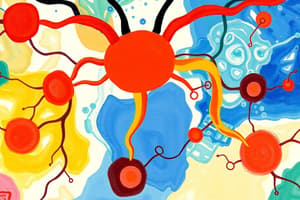Podcast
Questions and Answers
What is the function of animal hormones?
What is the function of animal hormones?
Animal hormones regulate various physiological functions such as metabolism, growth, development, and reproduction.
How do animal hormones communicate with target cells?
How do animal hormones communicate with target cells?
Animal hormones travel through the bloodstream and bind to specific receptors on target cells, triggering a response within the cell.
Give an example of an animal hormone and its function.
Give an example of an animal hormone and its function.
One example is insulin, which regulates blood sugar levels by promoting the uptake of glucose into cells.
Flashcards are hidden until you start studying
Study Notes
Function of Animal Hormones
- Regulate various physiological processes in the body, such as growth and development, metabolism, and reproductive functions
Communication with Target Cells
- Hormones communicate with target cells through a lock-and-key mechanism, where the hormone binds to a specific receptor on the surface of the target cell
- This binding causes a signal transduction pathway that triggers a response in the target cell
Example of an Animal Hormone
- Insulin: a hormone produced by the pancreas that regulates blood sugar levels by facilitating glucose uptake in cells
- Insulin's function is to lower blood sugar levels by promoting glucose storage and preventing glucose production in the liver
Studying That Suits You
Use AI to generate personalized quizzes and flashcards to suit your learning preferences.




